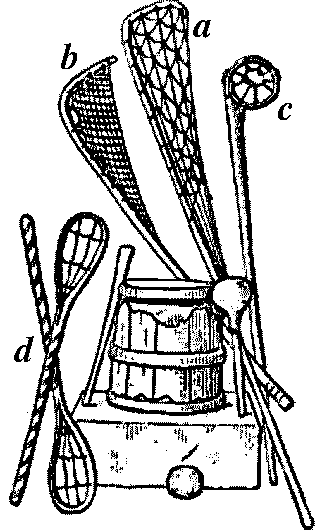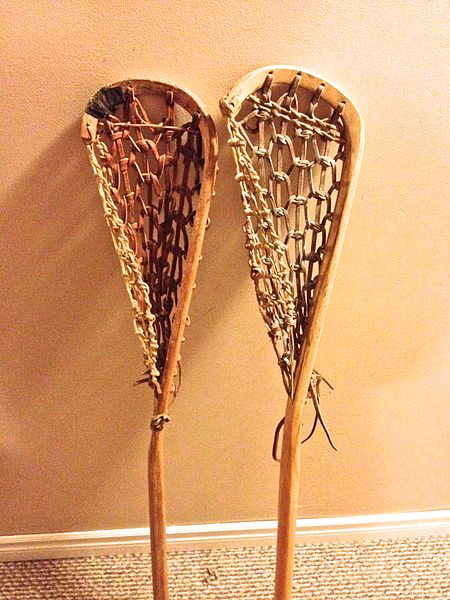Wandering around upstate New York early in the previous millennia, you might have enjoyed hospitality of many towns and settlements spread all over the land.
Haudenosaunee people, whom we today know as various Iroquois nations, lived there for centuries, growing crops of maize, squash and beans, farming, hunting and fishing, while maintaining one of the worlds’ earliest democracies through a remarkable set of laws that, centuries later, was used as an inspiration for USA modern-day constitution.

Their towns and villages were not excessively large, usually up to a few thousand or less citizens, dwelling in several longhouses – a sort of apartment buildings – hosting up to ten and more families belonging to the same clan.
The system worked well, leaving people with much time for entertainment, from betting games to various contests, with lacrosse being the most prominent and demanding, a very serious competition.
Originally this sacred ballgame was designed to please the Creator, the Right-Handed Twin himself. According to the legend it was played for the first time before the earth as we know it was created, in order to determine who will control the world, the good Right-Handed Twin, or his negative Left-Handed sibling. The good won, as always, and people never forgot, recreating the game to honor their benefactor, giving thanks to their benevolent creator.

The game of lacrosse demanded a great skill and lasting endurance. In order to score a goal you needed to catch the ball, a heavy affair made of wood or stuffed deerskin, into the net at the edge of your playing stick, carrying it to the other side of the field, against the attempts of the rival team to stop you or make you lose your cargo. One were not allowed to touch it with his hands.
The game was fairly violent, sometimes causing serious injuries, even though in the official games the players would wear a protective gear of additional clothing and padded baskets as helmets. Still one was expected to play fearlessly, displaying one’s stamina, strength, courage and quick thinking.
If you were lucky to catch the ball firmly, preventing its slipping from the basket-like net on the end of your playing stick, you then would dash for the other side of the field, hoping to score. Or you may try to pass it on to the other members of your team, if your rivals were truly determined to prevent you from doing that.
And yes, the opposite team would be desperate to stop you or make you lose the ball before reaching the boundaries of their marked goal posts, which could be of various sizes, sometimes quite a vast space, or sometimes just a simple mark of a rock or a tree. But large or small, the ball should have been landed there, between the marked boundaries, in order to win a point.

To participate in such game was an honor, and a privilege. To watch it was equally thrilling. The power of this competition, which has various names throughout various Haudenosaunee-Iroquois nations, with the word “lacrosse” being the most incorrect one, a mistaken term invented by French missionaries of 18th century, was a vigorous contest beyond being simple entertainment. It was believed to purify the soul and the body, testing its limits, pushing to exceed, bestowing gift of healing upon those who came to watch and cheer. This game made the creators smile.
Official contests could be held between towns and nations – solemn affairs of thanksgiving speeches and tobacco offerings, strict rules, hundreds of players and the dignity of the involved nations at stake. But as often, spontaneous games would break on the sunny afternoon, played at the open grounds of a town or a village, a friendly competition accompanied by almost no formalities. Life was not always stern and Haudenosaunee men, like anyone else on earth, welcomed the opportunity to exercise and relax, to show their skill or impress the girls.
An excerpt from “Two Rivers”, The Peacemaker Series, book #1.
Pushing another player out of his way, Tekeni leaped ahead, seeing the momentarily clear path. His shaft shot forward, as his eyes estimated the distance. Oh, yes, he was going to trap this ball, to catch it safely in his net, to make a run for the opposite team’s gates, and maybe, with a little luck, to score.
Racing on, oblivious of the cheering crowds, he turned sharply without slowing his step, catching his balance, ready to face the descending ball. It was coming down fast. For a fraction of a moment, he could see it clearly, a coarse, round thing made out of a stuffed deerskin, heavy enough to inflict damage if one wasn’t careful.
Blocking the sunlight, it made its way toward his outstretched arm, making it unnecessary to get into a better position, not even to tilt his body. It was going straight for his shaft. He caught his breath and felt the silence as the watching crowds went still, holding their breath, too.
Then, as the ball was about to land in his net, his arm shot sideways, driven away by a force he could not comprehend for a moment, the pain in it paralyzing, making him gasp. As the heavy body of another player slammed into him, he felt the grass slipping under his feet, jumping into his face, revoltingly damp, permeating his breath. From the corner of his eye, he could see the ball crashing into the earth just outside the field, cumbersome, powerless upon the ground.
“You will be out of the game before you know it!” shouted someone angrily.
Recognizing the voice of Ogtaeh, a player from his team, Tekeni wiped the mud from his face, blinking to make his vision focus.
“It was an accident,” answered Yeentso smugly, a thin half smile twisting his lips.
He was a tall, broadly built man of twenty or more summers, the best player of the opposite team.
“It was no accident!” fumed Ogtaeh. “I saw it all!” He turned to the surrounding players. “You all saw it, didn’t you?”
“Well, it might have been an accident,” murmured someone. “The slippery ground and all.”
“The slippery ground in your stupid dreams!” Spitting the remnants of the earth from his mouth, its taste mixed with the salty flavor of blood, Tekeni came closer, trying to pay no attention to the pain rolling up and down his arm. “He collided with me on purpose!” He took another step, glaring at Yeentso, seeing the hated face so very close, every scar, every speckle, every bead of sweat upon it. “And you hit me with your shaft to make sure I did not catch this ball, you dirty piece of excrement.”
The high cheekbones of the man took a darker shade.
“You better watch your tongue, wild boy,” said Yeentso, leaning forward.
Comments on Facebook
Comments
No Comments to “Lacrosse – the sacred game to please the creators”